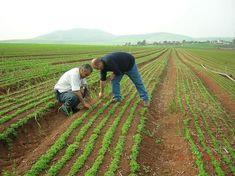
Five-years ago no-one would have thought it possible but 2005 will register an all-time record, with over 10,000 tonnes of fresh herbs, sent by air, to sales destinations around the world, and plans are underway to increase exports to at least 13,000t within the next three years, according to recent estimates by the Israeli ministry of agriculture.
In all fairness, the privatisation of Israel’s agriculture played an important role in making the country’s agricultural infrastructure a competitive enterprise, fresh herbs included, turning it into a high-tech industry, based on innovation, professionalism and discipline. Fresh herbs is one of the best examples in this respect.
There are two major exporters of fresh herbs from Israel: leading the group is Agrexco, which reportedly exports about 75 per cent of the total volume and Arava Growers, exporting approximately 20 per cent, followed by several smaller exporters, such as Agriver, with 400t and Riny Cherry Ltd, which exports fresh herbs, especially Rocolla, to Russia and several eastern European countries. Riny Cherry’s volume may be small, but according to the company, it has plans to significantly increase its export volumes over the coming years.
Agrexco and Arava Growers are focusing their main marketing strategies on Western Europe owing to the growing demand for fresh herbs on the continent, against a perceived slump in demand in the UK, which was once the fastest growing market for fresh herbs.
Yet, the UK remains a major marketing target for Israeli herbs, which are marketed directly to the chains or supplied, mainly by small exporters, to packers who re-pack the produce for the multiples.
Agrexco is the country’s largest exporter of fresh herbs, with some 30 varieties, of which Basil and chives comprise 50 per cent of the entire export basket.
Rocolla, mint, tarragon and Rosemary make up around 30 per cent, and the rest are comprised of several other varieties. Bezalel Madmon, fresh herbs product manager at Agrexco, says the company plans to export 7,200t of fresh herbs in 2005, a 20 per cent increase on the previous season.
“We export fresh herbs 12 months a year,” he says, “In 2005 we exported approximately 100t per week during the summer and 140-160t a week during the winter season.”
Agrexco is associated with 127 accredited farmers from the Arava region, the lower and upper Galilee, Jordan Valley, and the north western Negev.
Madmon claims there are two major factors limiting plans to increase export volumes. The first is each client’s specific requirements, since there are literally hundreds of different types of packaging that the company has to handle each day.
He says that in view of the high costs of labour in Europe and the US, clients insist on them getting the produce packed and ready to be placed on the shelves. The other factor is the constant and expensive research projects that are vital to ensure the development of the fresh herbs sector, which now supplies 50-60 per cent of fresh herbs to markets in Europe during the winter season and about 25 per cent during the summer season.
“Mechanisation, development of new or improved varieties, applying efficiency measures and adhering to clients’ requirements are the factors which help us maintain our position as major suppliers of fresh herbs to Europe,” he says.
Saul Isaacs, Arava Growers’ fresh herbs marketing manager, says his company plans to export some 2,500t of fresh herbs in 2005, to the tune of approximately e20m compared with 2,000t in 2004.
One third of the export is to be marketed in the UK, with the remaining two thirds going to the western and northern European and north American markets.
The main varieties exported by Arava Growers are basil, followed by chives, rocolla, mint, thyme, tarragon, oregano, rosemary and coriander. “The stability of produce-pricing, the credibility and continuity of supply and fulfiling clients’ requirements play an important role in Arava Growers’ marketing strategy, not to mention the top quality of our produce,” he says.
Isaacs also emphasises that Arava Growers is associated only with those farmers who are certified and accredited by BRC, EurepGAP and by the big chains.
Amos Betzer, general manager of Agriver, says his company is associated with 13 nominated Israeli growers who supply the herbs for export - chiefly basil and chives. Agriver also buys fresh herbs from farmers in Kenya, South Africa and Columbia. The company supplies it to wholesalers throughout Europe, which in turn pack the produce for the retail chains.
• Further information on Agrexco will follow later in the month.



